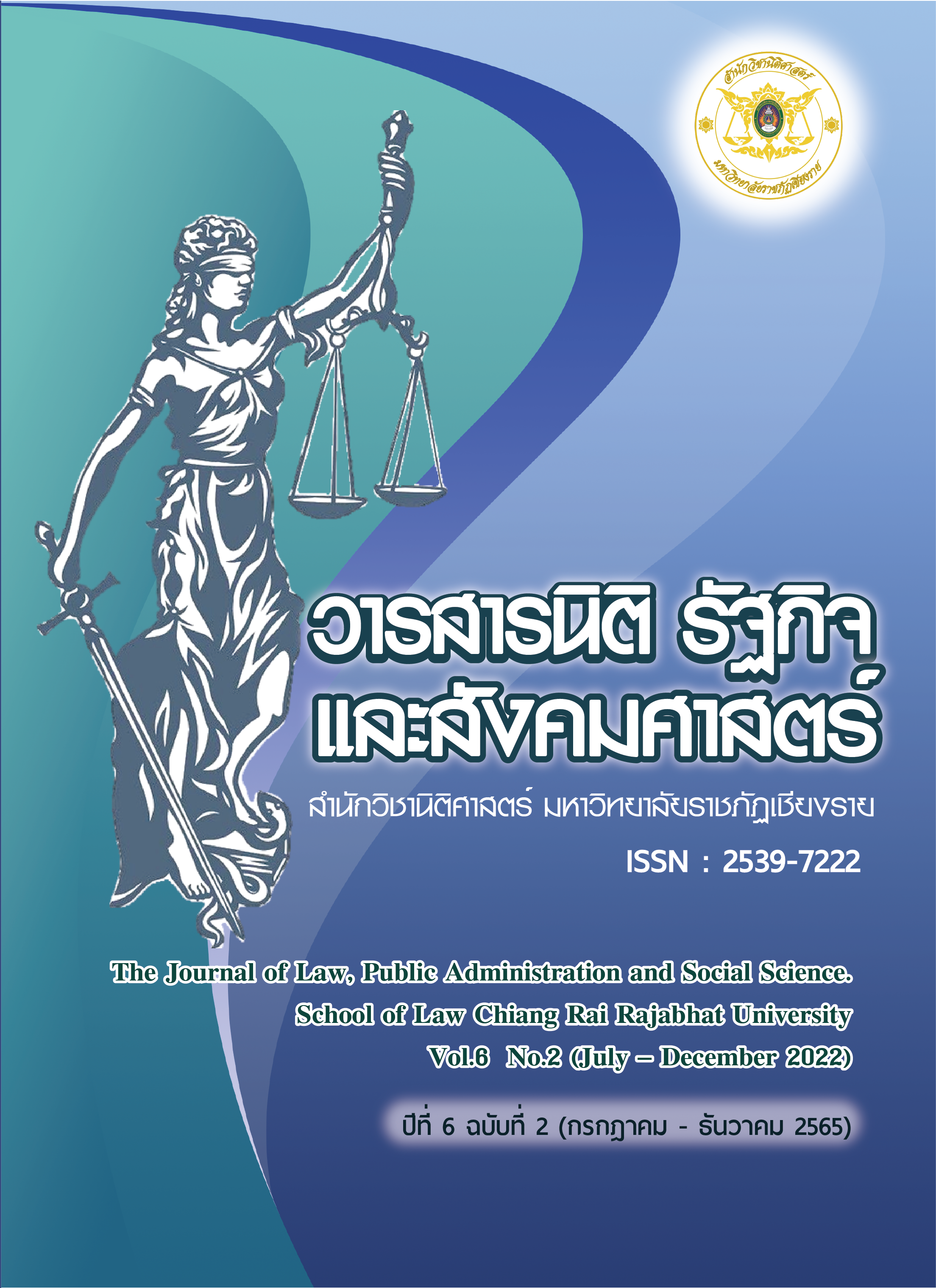A Model of participative wisdom of the elderly in Pa Sang Subdistrict Administrative Organization, Wiang Chiang Rung District, Chiang Rai Province.
Main Article Content
Abstract
The objectives of this research have threefold including were 3 items:
1) to study the components of participative wisdom knowledge management of the elderly 2) to create a model of knowledge management with participative wisdom of the elderly in Pa Sang Subdistrict Administrative Organization Wiang Chiang Rung District and 3) to examine a model of knowledge management with participative wisdom of the elderly in Pa Sang Subdistrict Administrative Organization Wiang Chiang Rung District. The population in this study was elderly people in Pa Sang Subdistrict Administrative Organization Wiang Chiang Rung District 300 people, specialists and experts in knowledge management 3 people and specialists and experts for validate the model 5 people, using 3 types of research tools comprising a questionnaire, an interview form and a formal interview form using an assessment form. The data were analyzed using statistical analysis of exploratory elements, percentage, mean, standard deviation and content analysis.
The results of the study found that 1) components of the process of cognitive knowledge management with participation of the elderly consisted of 6 components: (a) participation in creating wisdom knowledge (b) participation in management of wisdom knowledge collection (c) participation in the transfer and dissemination of wisdom knowledge; (d) participation in applying wisdom knowledge; (e) participation in the assessment of wisdom knowledge management; and (f) participation in seeking knowledge wisdom 2) A model of the process of cognitive knowledge management with participative wisdom of the elderly consists of 3 steps and 6 processes: Step 1st, the beginning of wisdom of the elderly, Step 2nd the building wisdom of the elderly, and step 3rd a model of the process of transferring wisdom and the 3 aspects of a model examination were: usefulness; possibility and image suitability is included in the criteria by which a model can be implemented.
Article Details
References
กัลยา วานิชย์บัญชา. การวิเคราะห์สถิติ: สถิติสำหรับบริหารและวิจัย. พิมพ์ครั้งที่ 10. กรุงเทพฯ: โรงพิมพ์จุฬาลงกรณ์มหาวิทยาลัย, 2556.
กอบกุล กวั่งซ้วน. “รูปแบบการถ่ายทอดภูมิปัญญาของผู้สูงอายุในเขตกรุงเทพมหานคร”. สารนิพนธ์สังคมสงเคราะห์ศาสตร์มหาบัณฑิตสาขาการบริหารและนโยบายสวัสดิการสังคม ภาควิชาสังคมสงเคราะห์ศาสตร์ คณะสังคมสงเคราะห์ศาสตร์ มหาวิทยาลัยธรรมศาสตร์, 2554.
จินต์ปวีร์ เจริญฉิมและสิริชัย ดีเลิศ. “กระบวนการถ่ายทอดภูมิปัญญาของผู้สูงอายุสู่ชุมชนและสังคมที่ยั่งยืน”.วารสารปาริชาต มหาวิทยาลัยทักษิณ. ฉ.33(2563): 152-167.
เจิมขวัญ รัชชุศานติ. “ศักยภาพการใช้ภูมิปัญญาเพื่อสร้างรายได้ของกลุ่มผู้สูงอายุ จังหวัดเชียงใหม่”. วารสารวิชาการมหาวิทยาลัยราชภัฏอุตรดิตถ์. ฉ.11(2559): 67-84.
โชติกา สิงหาเทพ, ธนิกานต์ ศรีจันทร์, และเสาวนีย์ จันทสังข์. “รายงานวิจัยชุมชนเรื่องบทบาทของผู้สูงอายุในการพัฒนาภูมิปัญญาท้องถิ่น ตามหลักปรัชญาเศรษฐกิจพอเพียง ตำบลโคกมั่งงอย อำเภอคอนสวรรค์ จังหวัดชัยภูมิ”. ทุนวิจัย สำนักวิจัยและพัฒนาสถาบันพระปกเกล้า, 2561.
เดชวิทย์ นิลวรรณ และ ทิพย์พธู กฤษสุนทร. “กระบวนการและกลยุทธ์การถ่ายทอดภูมิปัญญาท้องถิ่น กรณีศึกษาเทศบาลตำบลฟ้าฮ่าม อำเภอเมือง จังหวัดเชียงใหม่”. งานวิจัยคณะวิทยาการจัดการ มหาวิทยาลัยราชภัฏเชียงใหม่, 2557.
วาโร เพ็งสวัสดิ์. “การวิจัยพัฒนารูปแบบ.” วารสารมหาวิทยาลัยราชภัฏสกลนคร. ฉ.4 (2553): 9.
Cronbach, Lee. J. “Essentials of Psychology Testing”. 5thed. New York: Harper Collins Publishers Inc., 1990.
Field, A. P., Miles, J., & Field, Z. “Discovering statistics using R”. Thousand Oaks. CA: Sage, 2012.


